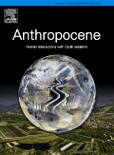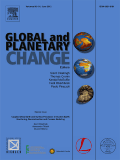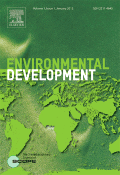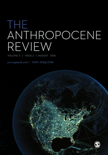
Anthropocene
metrics 2024
Unraveling the Interplay Between Humanity and Nature
Introduction
Anthropocene, published by Elsevier Science Ltd, is a leading journal dedicated to the interdisciplinary study of the Anthropocene epoch, focusing on the profound impacts of human activity on Earth systems and ecosystems. With an impressive impact factor reflected in its Q1 rankings in Earth and Planetary Sciences and Ecology, as well as a solid standing in Global and Planetary Change, this journal is a vital resource for researchers, professionals, and students striving to understand and address the pressing environmental challenges of our time. Since its inception in 2013, the journal has been committed to publishing high-quality, peer-reviewed articles that stimulate critical discourse and inspire innovative solutions to complex ecological issues. Although not an open-access journal, Anthropocene provides extensive access options through institutional subscriptions, making its significant research readily available to the academic community. Based in the United Kingdom, the journal serves as a cornerstone for scholarship in a rapidly evolving field, bridging gaps across disciplines and encouraging interdisciplinary collaboration for a sustainable future.
Metrics 2024
 1.02
1.02 3.30
3.30 3.60
3.60 43
43Metrics History
Rank 2024
Scopus
IF (Web Of Science)
JCI (Web Of Science)
Quartile History
Similar Journals

Earth Systems and Environment
Unraveling the Complexities of Earth SystemsEarth Systems and Environment, published by Springer International Publishing AG, is a leading peer-reviewed journal dedicated to the multidisciplinary study of natural and anthropogenic processes that shape the Earth's systems. With an impressive impact factor and consistently ranked in the Q1 category across various fields, including Computers in Earth Sciences, Economic Geology, and Environmental Science, it stands as a premier platform for researchers and professionals seeking to address pressing environmental challenges. The journal covers a wide spectrum of topics, from geology to global change, and emphasizes innovative methodologies and interdisciplinary approaches to understand and manage Earth systems. As an essential resource for scholars and practitioners, Earth Systems and Environment commits to excellence and facilitates open dialogue on critical issues affecting our planet.

Trees Forests and People
Exploring the Vital Connections Between Nature and HumanityTrees, Forests and People is an esteemed peer-reviewed journal published by Elsevier that commenced its journey in 2020 and focuses on the intricate relationships between trees, forests, and human communities. With its E-ISSN of 2666-7193, this journal serves as a vital platform for presenting cutting-edge research in disciplines such as forestry, environmental science, and management. Recognized for its impact within the academic community, it has achieved a prestigious Q1 ranking in both Economics, Econometrics and Finance (Miscellaneous) and Forestry, alongside a Q2 ranking in Management, Monitoring, Policy and Law as of 2023. Its Scopus rankings indicate robust positioning in various fields, appealing to a diverse audience of researchers, professionals, and policy-makers engaged in sustainable forest management and ecosystem services. By offering open access options, the journal ensures that critical findings are readily available to a global audience, fostering knowledge sharing and collaborative efforts aimed at addressing the pressing challenges in forest conservation and management.

Earths Future
Transforming Research into Action for a Better TomorrowEarth's Future, published by the American Geophysical Union, is a distinguished open-access journal that has been fostering scholarly communication since 2013. With an impressive Q1 ranking in both Earth and Planetary Sciences and Environmental Science for 2023, this journal stands at the forefront of disseminating cutting-edge research. Its comprehensive scope covers integral topics essential for understanding the dynamics of our planet and the complexities of environmental changes. Housed in the United States, Earth's Future is particularly valuable for researchers and professionals dedicated to addressing pressing global issues through interdisciplinary approaches. The journal's remarkable Scopus rankings—4th among 159 in Earth and Planetary Sciences and 26th among 233 in General Environmental Science—highlight its influence and the high-quality contributions it publishes. By providing open access since its inception, Earth's Future ensures that innovative findings are readily available to a global audience, fostering collaboration and knowledge-sharing essential for tackling tomorrow's challenges.

Regional Environmental Change
Transforming Research into Action for Regional ResilienceRegional Environmental Change, published by SPRINGER HEIDELBERG, is a leading journal dedicated to the critical field of Environmental Science, specifically focusing on the global and planetary changes affecting our regional environments. Since its inception in 2005 and continuing through 2024, the journal has been a pivotal platform for disseminating cutting-edge research, insights, and methodologies that address pressing environmental issues. With an impressive Scopus rank, placing it in the top 30% of journals in its category, Regional Environmental Change (ISSN: 1436-3798; E-ISSN: 1436-378X) showcases high-quality academic articles that engage with the multifaceted impacts of environmental shifts, providing researchers, professionals, and students with vital knowledge and data. Although the journal does not currently offer Open Access, it remains a crucial resource for those committed to understanding and mitigating the effects of environmental change on regional ecosystems and communities.

GLOBAL AND PLANETARY CHANGE
Exploring the Dynamics of Our Changing PlanetGLOBAL AND PLANETARY CHANGE, published by Elsevier, is a premier international journal focused on the critical issues surrounding environmental science, climate change, and planetary dynamics. Since its inception in 1989, this journal has established itself as a leading voice in the field, currently holding a prestigious Q1 ranking in both Global and Planetary Change and Oceanography as of 2023. With a remarkable influence reflected in its Scopus rankings—15th in Earth and Planetary Sciences and 34th in Global and Planetary Change—it serves as an essential platform for researchers, professionals, and students. The journal provides a comprehensive examination of cutting-edge research findings and innovative developments that address the urgent challenges facing our planet. Although it is not an Open Access journal, it remains a vital resource for anyone keen to contribute to or stay informed on the ever-evolving discourse of global environmental change, promoting sustainable solutions for the future.

Journal of Integrative Environmental Sciences
Shaping the future of environmental science and public health.Journal of Integrative Environmental Sciences, published by Taylor & Francis Ltd, stands as a pivotal platform for researchers and professionals in the fields of Environmental Science and Public Health. With an impact factor reflecting its significance in the academic community, this Open Access journal has been democratizing access to cutting-edge research since 2016, enhancing visibility and dissemination of vital insights. The journal covers a wide scope, converging studies from 2010 to 2024, and holds esteemed rankings in Q2 quartiles for Environmental Science and Public Health, indicating its substantial contribution to these critical fields. With Scopus rankings placing it favorably among its peers, researchers benefit from a diverse array of articles addressing pressing environmental and health issues, sustainability, and renewable energy. As an essential resource for advancing knowledge and fostering innovation, the Journal of Integrative Environmental Sciences encourages contributions that span interdisciplinary approaches to solving some of the most challenging environmental dilemmas of our time.

Environmental Development
Exploring the intersection of geography, planning, and environmental science.Environmental Development is a premier academic journal published by Elsevier, dedicated to advancing the field of environmental science through interdisciplinary research and innovative practices. With a focus on geography, planning, and development, as well as management, monitoring, policy, and law, this journal provides a rigorous platform for scholars and practitioners to share insights that shape sustainable environmental policy and practice. Holding a prestigious Q1 ranking in both relevant categories and boasting impressive Scopus rankings - 62 out of 821 in Geography and 60 out of 399 in Environmental Science - Environmental Development stands out as a critical resource for those invested in the future of our planet. The journal emphasizes impactful research that addresses contemporary challenges, fostering dialogue across disciplines and geographical boundaries. With a commitment to high-quality research, it offers an important outlet for those aiming to influence environmental policy and developmental strategies globally. Join the growing community of researchers, professionals, and students engaged in promoting sustainable environmental practices through the knowledge shared in this esteemed publication.

All Earth
Championing Open Access to Earth Science InsightsAll Earth is an esteemed open-access journal published by Taylor & Francis Ltd, dedicated to multidisciplinary research in the fields of Earth and Planetary Sciences, Global and Planetary Change, as well as Management, Monitoring, Policy, and Law. Since its inception in 2021, All Earth has swiftly positioned itself in the academic community, achieving notable rankings such as Q2 in Earth and Planetary Sciences and Q3 in related fields, showcasing its commitment to high-quality interdisciplinary scholarship. Researchers and professionals can benefit from its accessible content, which contributes to the ongoing discourse on critical environmental issues and innovative solutions for sustainable development. The journal is based in the United Kingdom and continues to be a vital source of information and inspiration for students and scholars aiming to tackle the pressing challenges of our planet through rigorous scientific inquiry and policy analysis.

Anthropocene Review
Navigating the Complexities of Human-Environment InteractionsAnthropocene Review is a prominent academic journal published by SAGE Publications Inc. that focuses on the interdisciplinary study of the Anthropocene—a term used to describe the significant global changes resulting from human activity. Launched in 2014 and forming part of its converged years until 2024, this journal has quickly established itself as an essential resource for researchers and professionals in the fields of Ecology, Geology, and Global and Planetary Change, as evidenced by its notable Q2 and Q3 rankings in these categories. With a solid Scopus ranking placing it within the top tiers of Earth and Planetary Sciences and Environmental Science disciplines, the Anthropocene Review aims to shed light on the complex interactions between human actions and the environment, fostering a deeper understanding of sustainability and ecological impacts. While currently not an open-access journal, it provides crucial research findings and theoretical advancements that appeal to students and academics alike, shaping the discourse on our planet's future.

Forestist
Exploring the future of forest management and conservation.Forestist, published by AVES, is a pivotal open-access journal dedicated to the field of Forestry, providing a platform for researchers, professionals, and students to explore cutting-edge developments and research within the discipline since 1980. Operating from Turkey, this journal offers a unique opportunity for scholars to share their findings with a broad audience, contributing to the global discourse on sustainable forest management, conservation practices, and ecological research. With an impressive impact factor and a current categorization in the Q3 quartile for 2023, Forestist ranks among the essential resources in Agricultural and Biological Sciences, particularly within the realm of Forestry, as indicated by its Scopus ranking of #119 out of 174 journals. This publication is committed to fostering open access to knowledge, making research freely available while encouraging innovative studies that address the pressing challenges in forestry and environmental science.